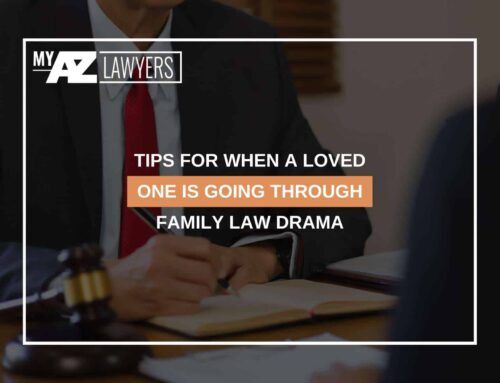Table Of Contents
What Is A Parenting Coordinator?
If you’re familiar with anything about child custody cases, you probably know that some parents split more amicably than others. Maintaining a somewhat friendly relationship with an ex can be difficult, but is often necessary for effective co-parenting. If you and your ex are struggling to come to an agreement about your parenting plan, it may be time for a parenting coordinator to step in. Parenting coordinators play a crucial role in the process of obtaining a parenting plan that serves the child’s best interests. Read on to learn more about what a parenting coordinator does, and if one will be assigned to your Arizona family law case. If you’re seeking an experienced family law attorney in Phoenix or Pima county, contact My AZ Lawyers for your free consultation at 480-470-1504.

Parenting Coordinators In Arizona Family Law Matters
The role of a parenting coordinator is defined in Rule 74 of the Arizona Rules of Family Law Procedure. A parenting coordinator is meant to simplify the custody process by assisting parents with their physical and legal custody agreements and helping resolve any disputes that may arise. A third party can be appointed as a parenting coordinator after the court has entered orders for physical and legal custody. Both parents must agree to the appointment of the parenting coordinator verbally or in writing.
There are six types of people who qualify to serve as a parenting coordinator in Arizona:
- An attorney licensed to practice law in Arizona;
- A psychiatrist licensed to practice medicine or osteopathy in Arizona;
- A psychologist licensed to practice psychology in Arizona;
- A person licensed to practice independently by the Arizona Board of Behavioral Health Examiners;
- Professional staff of a court’s conciliation services department; and
- A person with education, experience, and expertise who is deemed qualified by the court’s presiding judge or designee.
The parenting coordinator’s assignment term will be designated in the order, and cannot initially exceed one year. At the end of the term, the parenting coordinator can be reappointed if they agree to it, along with both parents. Here, the parents have the option to agree to an appointment of more than one year. If the parenting coordinator wishes to resign, they will do so by court order and both parents will be notified. Under these circumstances, the parents can agree to a replacement parenting coordinator.
A parenting coordinator’s communications are not confidential and privileged like some might be with other types of professionals. The parenting coordinator is not meant to give opinions that significantly sway the court’s rulings on parenting time and legal decision-making. Some of the coordinator’s statutory duties include:
- Addressing disputed issues
- Reducing misunderstandings
- Clarifying priorities
- Exploring possibilities for compromise
- Developing methods of collaboration in parenting
- Complying with legal decision-making authority and parenting time orders
What Is A High-Conflict Case?
Any type of custody matter is technically a conflict, but certain factors discernibly make a case “high conflict” from the court’s perspective. This level of conflict can impede the parents’ ability to devise an effective parenting plan. It can also become a waste of the court’s time and resources if it drags on too long. Parenting coordinators are even more important in high-conflict cases than they are in cases without any special issues. Some of the signs of a high-conflict family law case include:
- History of domestic violence or physical aggressiveness
- Threats
- Restraining orders
- Excessive litigation, including intentional strategies to delay the case
- Parental alienation, or attempting to turn the child against the other parent
- Lack of communication or cooperation
- Arguments or fights during custody exchanges
If reading this list leads you to believe that you’re in a high-conflict family law matter, there’s already a fair chance that the judge isn’t your biggest fan. If you’ve already worn out the judge’s patience on trivial issues, this could create the risk of negative rulings on more important issues later on in the case. A parent in a high-conflict custody matter could already be on an uneven playing field if their ex has retained a particularly experienced and aggressive family law attorney. Whether you want to even things out or proactively give yourself the legal advantage, our Arizona family law firm has skillful and knowledgeable attorneys who know how to navigate our court system. Let us review your case to determine the best strategies to achieve the custody results that would be best for your family. Schedule your free consultation by phone today at 480-470-1504.
Tips For Reducing Conflict In Family Law Matters
The fact that one even needs to be involved in the family law system can be stressful enough for most people. If the family law matter is high-conflict, everyone involved will be worse off for it, and it can be damaging to the self-esteem and development of young children. Below are some tips for reducing conflict and its negative consequences in Arizona family law matters. For help enacting them in real-life disputes and arguments, contact our Arizona family law firm at 480-470-1504.
- Take advantage of time for pause with text and email communications: There is no guarantee that just because you maintain a calm demeanor while co-parenting that your child’s other parent will do the same. If your ex is being rude or unreasonable, take a few minutes to do some deep breathing, go on a walk, or whatever calms you down before responding. You can always save any clear evidence of your ex’s mistreatment, and your choice to take the high road, but a few snippy messages don’t justify the time and expense of going back to court.
- Document negative interactions with your child’s other parent: Many parents keep a journal that helps document how their custody situation progresses. This can help you keep track of any instances of parental conflict and when they occur.
- Consider supervised custody exchanges if the situation gets too out of hand: Custody exchanges can be a tense and regular occasion, especially if one or both parents tends to run late. If this pattern is consistent and significant, it may be time to consider supervised custody exchanges. These are similar in concept to supervised visitation, but the neutral third party only oversees when the child is handed off to the other parent.
- Recognize that more extreme measures may be necessary in cases of domestic violence and child abuse: A high-conflict case refers to interpersonal issues rather than a case of violence or abuse. If your family law case is also proceeding through the criminal justice system, these tips to reduce conflict don’t apply.
Have More Questions About Arizona Child Custody Issues? Schedule Your Free Consultation With My AZ Lawyers Today.
If you are considering the possibility of a parenting coordinator in your Arizona child custody case, you could probably benefit from skilled family law representation as well. High-conflict cases deserve special care and attention, which will benefit your children in the long run. Our experienced family law attorneys team are backed by dedicated and persistent staff who know what it takes to deliver positive outcomes in Arizona family law matters. Schedule your free consultation today by calling 480-470-1504.

MY AZ LAWYERS
Email: [email protected]
Website: www.myazlawyers.com
Mesa Location
1731 West Baseline Rd., Suite #100
Mesa, AZ 85202
Office: 480-448-9800
Phoenix Location
343 West Roosevelt, Suite #100
Phoenix, AZ 85003
Office: 602-609-7000
Glendale Location
20325 N 51st Avenue Suite #134, Building 5
Glendale, AZ 85308
Office: 602-509-0955
Tucson Location
2 East Congress St., Suite #900-6A
Tucson, AZ 85701
Office: 520-441-1450
Avondale Location
12725 W. Indian School Rd., Ste E, #101
Avondale, AZ 85392
Office: 623-469-6603











